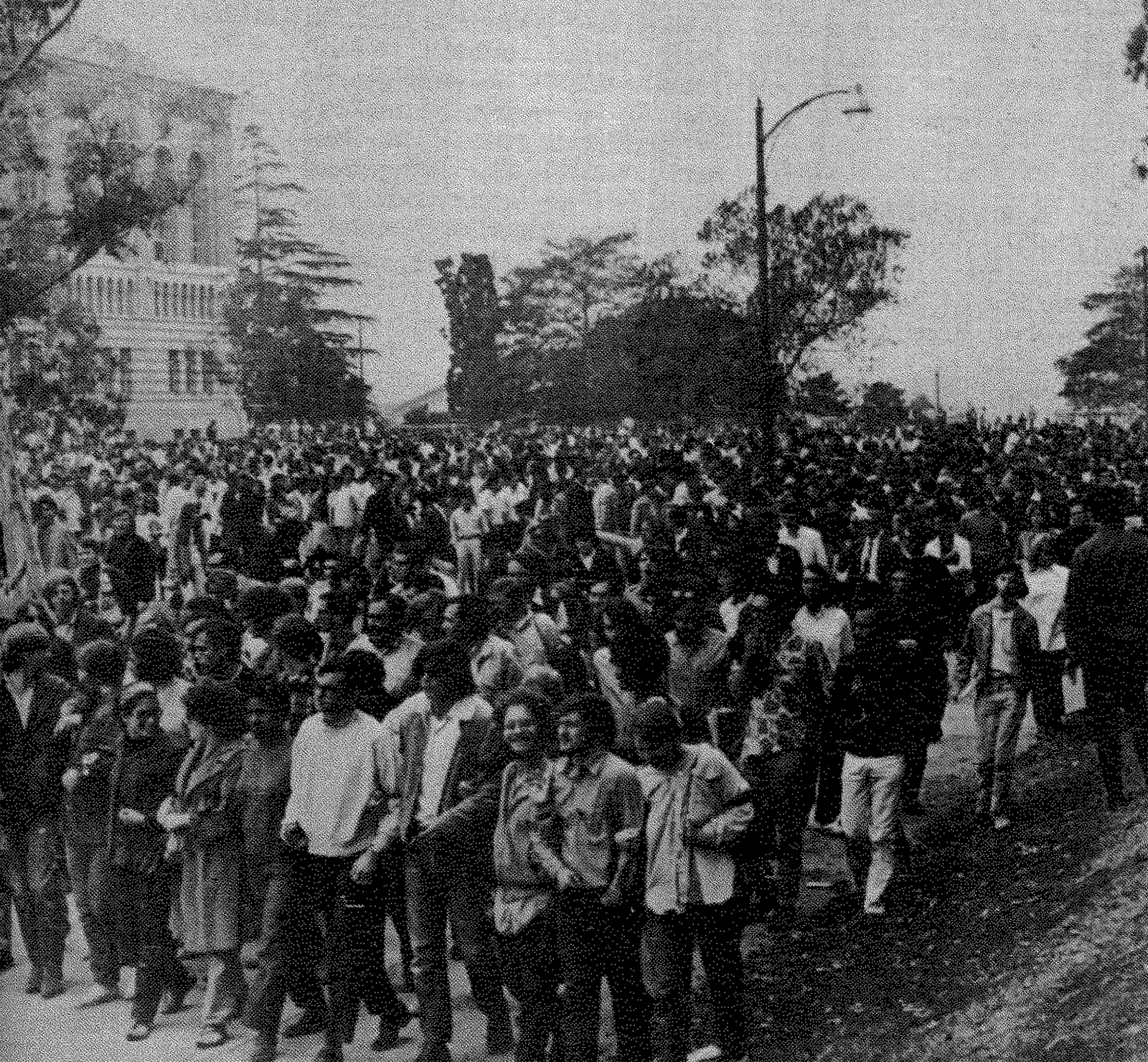Arthur Wang: ‘Bloody Thursday’ defines lack of dialogue between UC, students

UCLA students occupied Murphy Hall to remember a student who died when the National Guard shot at a crowd of activists at UC Berkeley. (Daily Bruin file photo)
By Arthur Wang
May 18, 2015 1:50 a.m.
All of us cheered when Gov. Jerry Brown struck a “historic” deal with the University of California and its president, Janet Napolitano, freezing tuition increases for two years and promising annual 4 percent budgetary increases over the next four.
But few of us, especially the student activists who were at the forefront of last year’s tuition hike protests, would count Napolitano as our friend.
Napolitano’s leadership, qualifications and intentions have been challenged since, quite literally, the first day she was appointed to lead the UC in July 2013. Her relationship with students has always been troubled, and even when she works toward budget increases that are favorable to all, students question her qualifications and her intentions. This adversarial relationship is but the latest consequence of a decades-long strained relationship between students and UC leaders, who include top legislators, the governor and the Board of Regents.
Students have long felt rather powerless and like they lack a say in the policies and goals of the UC. That is because the UC continues to suffer from a lack of dialogue between officials and student voices. The student regent position on the UC Board of Regents is one of the only substantial avenues that students have to influence UC policy within the institution itself – and there is only one voting student regent at a time, who only has one year of voting power. The student representative’s powers must be expanded or multiplied if students want a University that most faithfully serves student needs.
Mid-May is a particularly apt moment to call attention to the strained relationship between students and University leaders. Almost exactly 46 years ago, then-Gov. Ronald Reagan dealt a lethal blow in UC student-state relations by allowing lethal force against protesters occupying People’s Park in UC Berkeley.
Student-state relations reached a nadir on May 15, 1969, when the so-called “Great Communicator” mobilized the National Guard to suppress a student movement to transform an empty university-owned lot into a public space that later became known as People’s Park.
Berkeley’s mayor, seeking to regain control of the situation, called Reagan to send state-level assistance to quell the movement. Reagan saw this as an opportunity to capitalize on actualizing his campaign slogan to “clean up the mess at Berkeley,” referring to Berkeley’s counterculture movement and growing leftism.
He oversaw an astonishingly violent end to the People’s Park protest. Reagan’s chief of staff gave the sheriff’s deputies and the police free rein to disperse the protesters. Officers and sheriff’s deputies fired at the students, initially using injury-inducing birdshot ammunition but later switching to lethal-grade buckshot. Scores of students were injured, one bystander was blinded and student James Rector was declared dead four days after the protest. The incident came to be known as “Bloody Thursday.”
Reagan subsequently declared a state of emergency and mobilized the National Guard, which worked in conjunction with Berkeley police and was armed with tear gas and rifles in an effective military occupation of the city.
The establishment of the student position on the UC Board of Regents, proposed via legislative referendum and passed by the voters in 1974, was a direct consequence of the tumult of the 1960s. It was and remains an attempt to balance the imbalanced nature of University governance and decision-making. The UC Student Association, sometimes criticized for being a pointless organization, plays a central role in the student regent selection process, although the current regents still get the final say.
The student regent holds the same amount of power as all other members of the Board of Regents, but his or her role is unique. The seven ex-officio regents are legislators primarily concerned with serving their constituencies. The 18 governor-appointed regents are most concerned about fiduciary matters pertinent to the modern corporate higher education governance system. The student regent, however, is the sole representative of the interests of more than 230,000 paying students.
The notion that the student regent holds equal power is a deceptive one. Appointed regents serve 12-year terms, which allows for the development of institutional memory and general know-how among the leadership. Student regents, on the other hand, sit for only two years and can only vote their second year. In that brief amount of time, these driven but undeniably inexperienced individuals are required to hold their own against more seasoned and powerful authority figures.
As a consequence of the student regents’ severely limited authority, students continue to take action by all other available means – shouting and picketing behind the long shadow of Ronald Reagan and the adversarial relationship that has hardly improved.
By declaring students as, ironically, the enemy of the university, Reagan was the inaugural figure in creating an unpleasant and difficult dynamic between students and the state. The best way to recognize the legacy of the man who declared that “it’s morning in America” is to make sure we prevent the sun from setting on the students of the UC.


